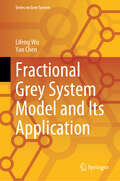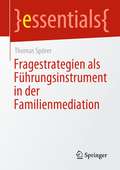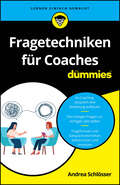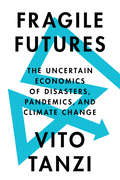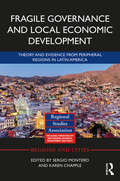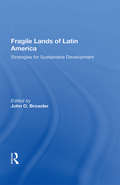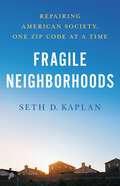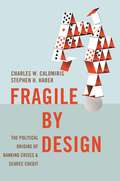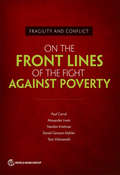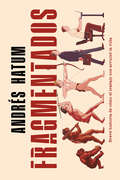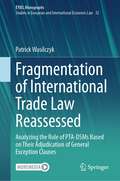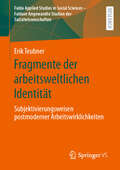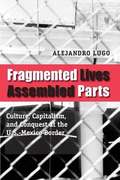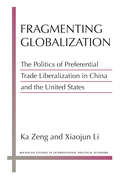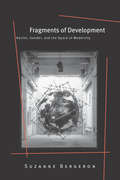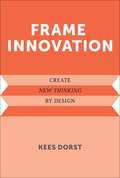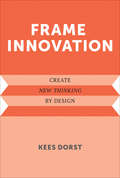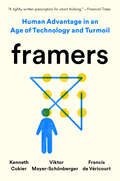- Table View
- List View
Fractional Grey System Model and Its Application (Series on Grey System)
by Yan Chen Lifeng WuThis book covers up-to-date theoretical and applied advances in fractional order grey systems theory from across the world and vividly presents the reader with the overall picture of this new theory and its frontier research. Many of the concepts, models, and methods in the book are original by the author, including grey system model with the fractional order accumulation and its properties, the relationship between the sample size and the stability of grey forecasting model, applications of the fractional order grey models in sustainable development and energy consumption forecasting, grey forecasting model for the middle size data, etc. This book is appropriate as a reference and/or professional book for courses of environmental management and grey system theory for graduate students or high-level undergraduate students, majoring in areas of science, technology, agriculture, environmental science, earth science, economics, and management. It is also utilized by researchers and practitioners in research institutions, business entities, and government agencies.
Fragestrategien als Führungsinstrument in der Familienmediation (essentials)
by Thomas SpörerFragestrategien haben für die Gesprächsführung in Mediationsverfahren inhaltlich und führungstechnisch eine zentrale Funktion. Dennoch spielen sie in den meisten Ausbildungsgängen zum Mediator/zur Mediatorin keine hervorgehobene Rolle. Dieser Band thematisiert u.a. eine beobachtbare allgemeine Unsicherheit bei Mediatoren bezüglich der systematischen Anwendung und Gestaltung von Fragestrategien.Er erläutert dabei exemplarisch anhand eines idealtypischen Mediationsverlaufs für Paare Schritt für Schritt die fragegestützte Gestaltung und Entwicklung solcher Einigungsprozesse und unterstreicht den damit entstehenden Nutzen eines solchen Weges nicht nur für die Betroffenen, sondern auch für die Mediatoren selbst.
Fragetechniken für Coaches für Dummies (Für Dummies)
by Andrea SchlösserDie Kunst des Fragens – Ihr Schlüssel zu erfolgreichen Coachings Fragen sind das Herzstück jedes Coaching-Prozesses. Sie regen Klienten zum Nachdenken an, eröffnen neue Perspektiven und fördern nachhaltige Veränderungen. Doch welche Fragen sind wann am sinnvollsten? Andrea Schlösser zeigt Ihnen, wie Sie einen vertrauensvollen Gesprächsrahmen schaffen, in dem sich Ihre Klienten öffnen und echte Erkenntnisse gewinnen. Sie führt Sie durch die Vielfalt der Frageformen und erklärt, wie Sie diese gezielt im Coaching-Gespräch einsetzen. Freuen Sie sich auf praktische Tipps und wertvolle Formulierungshilfen. Sie erfahren Was erfolgreiche Gespräche brauchen Welche Frageformen es gibt Wie Sie richtig gute Fragen stellen Wie Sie schwierige Gesprächssituationen souverän meistern
Fragile Futures: The Uncertain Economics of Disasters, Pandemics, and Climate Change
by Vito TanziThis book revisits a distinction introduced in 1921 by economists Frank Knight and John Maynard Keynes: that between statistically predictable future events ('risks') and statistically unpredictable, uncertain events ('uncertainties'). Governments have generally ignored the latter, perceiving phenomena such as pandemics, natural disasters and climate change as uncontrollable Acts of God. As a result, there has been little if any preparation for future catastrophes. Our modern society is more interconnected and more globalized than ever. Dealing with uncertain future events requires a stronger and more globally coordinated government response. This book suggests a larger, more global government role in dealing with these disasters and keeping economic inequalities low. Major institutional changes, such as regulating the private sector for the common good and dealing with special harms, risks and crises, especially those concerning climate change and pandemics, are necessary in order to achieve any semblance of future progress for humankind.
Fragile Governance and Local Economic Development: Theory and Evidence from Peripheral Regions in Latin America (Regions and Cities)
by Sergio Montero Karen ChappleMuch of our understanding of local economic development is based on large urban agglomerations as nodes of innovation and competitive advantage, connecting territories to global value chains. However, this framework cannot so easily be applied to peripheral regions and secondary cities in either the Global South or the North. This book proposes an alternative way of looking at local economic development based on the idea of fragile governance and three variables: associations and networks; learning processes; and leadership and conflict management in six Latin American peripheral regions. The case studies illustrate the challenges of governance in small and intermediate cities in Latin America, and showcase strategies that are being used to achieve a more resilient and territorial vision of local economic development. This book will be of interest to students and researchers of local economic development, urban and regional studies, and political economy in Latin America as well as to policy-makers and practitioners interested in local and regional economic development policy.
Fragile Lands Of Latin America: Strategies For Sustainable Development
by John O. BrowderThis book of selected research papers, originally presented at the "Symposium of Fragile Lands of Latin America—The Search for Sustainable Uses," presents some fresh evidence of the viability of a few "non-conventional" strategies for natural resource development and management.
Fragile Neighborhoods: Repairing American Society, One Zip Code at a Time
by Seth D. KaplanAn &“essential and engaging &” (Richard Florida) exploration of social decline in America: its true causes and the practical steps each of us can take to combat it, starting with the places we call home. The neighborhoods we live in impact our lives in so many ways: they determine who we know, what resources and opportunities we have access to, the quality of schools our kids go to, our sense of security and belonging, and even how long we live. Yet too many of us live in neighborhoods plagued by rising crime, school violence, family disintegration, addiction, alienation, and despair. Even the wealthiest neighborhoods are not immune; while poverty exacerbates these challenges, they exist in zip codes rich and poor, rural and urban, and everything in between. In Fragile Neighborhoods, fragile states expert Seth D. Kaplan offers a bold new vision for addressing social decline in America, one zip code at a time. By revitalizing our local institutions—and the social ties that knit them together—we can all turn our neighborhoods into places where people and families can thrive. Readers will meet the innovative individuals and organizations pioneering new approaches to everything from youth mentoring to affordable housing: people like Dreama, a former lawyer whose organization works with local leaders and educators in rural Appalachia to equip young people with the social support they need to succeed in school; and Chris, whose Detroit-based non-profit turns vacant school buildings into community resource hubs. Along the way, Kaplan offers a set of practical lessons to inspire similar work, reminding us that when change is hyperlocal, everyone has the opportunity to contribute.
Fragile by Design: The Political Origins of Banking Crises and Scarce Credit (The Princeton Economic History of the Western World #50)
by Charles W. Calomiris Stephen HaberWhy stable banking systems are so rareWhy are banking systems unstable in so many countries—but not in others? The United States has had twelve systemic banking crises since 1840, while Canada has had none. The banking systems of Mexico and Brazil have not only been crisis prone but have provided miniscule amounts of credit to business enterprises and households.Analyzing the political and banking history of the United Kingdom, the United States, Canada, Mexico, and Brazil through several centuries, Fragile by Design demonstrates that chronic banking crises and scarce credit are not accidents. Calomiris and Haber combine political history and economics to examine how coalitions of politicians, bankers, and other interest groups form, why they endure, and how they generate policies that determine who gets to be a banker, who has access to credit, and who pays for bank bailouts and rescues.Fragile by Design is a revealing exploration of the ways that politics inevitably intrudes into bank regulation.
Fragility and Conflict: On the Front Lines of the Fight against Poverty
by Paul Corral Alexander Irwin Nandini Krishnan MahlerFragility and conflict pose a critical threat to the global goal of ending extreme poverty. Between 1990 and 2015, successful development strategies reduced the proportion of the world’s people living in extreme poverty from 36 to 10 percent. But in many fragile and conflict-affected situations (FCS), poverty is stagnating or getting worse. The number of people living in proximity to conflict has nearly doubled worldwide since 2007. In the Middle East and North Africa, one in five people now lives in such conditions. The number of forcibly displaced persons worldwide has also more than doubled in the same period, exceeding 70 million in 2017. If current trends continue, by the end of 2020, the number of extremely poor people living in economies affected by fragility and conflict will exceed the number of poor people in all other settings combined. This book shows why addressing fragility and conflict is vital for poverty goals and charts directions for action. It presents new estimates of welfare in FCS, filling gaps in previous knowledge, and analyzes the multidimensional nature of poverty in these settings. It shows that data deprivation in FCS has prevented an accurate global picture of fragility, poverty, and their interactions, and it explains how innovative new measurement strategies are tackling these challenges. The book discusses the long-term consequences of conflict and introduces a data-driven classification of countries by fragility profile, showing opportunities for tailored policy interventions and the need for monitoring multiple markers of fragility. The book strengthens understanding of what poverty reduction in FCS will require and what it can achieve.
Fragmentados: Breve historia de cómo el trabajo nos arruinó la vida
by Andrés HatumEn Fragmentados Andrés Hatum describe, analiza y ejemplifica las distintas formas en que el trabajo nos arruinó y fragmentó la vida. Arruinar, por lo inhumano de ciertos trabajos, en particular en momentos como la Revolución Industrial; fragmentar porque, en vez de estar integrados en nuestra vida, los trabajos se metieron como una cuña para complicárnosla. Vivimos en una sociedad fragmentada. Llevamos vidas fragmentarias. El covid y el aislamiento ensancharon la distancia. También, y quizá más que en ningún otro lugar, en el siempre crítico ámbito del trabajo. Preguntémonos cuáles son las personas con las que más interactuamos. ¿Cuál es nuestro "círculo social"? Este simple ejercicio nos permitirá entender si somos habitantes de una comunidad amplia o restringida; si compartimos nuestra existencia de una forma inclusiva, vital, abierta a los demás, o estamos en una isla en la que todos son parecidos a nosotros. En Fragmentados Andrés Hatum nos invita a una reflexión profunda sobre nuestras relaciones en el día a día, pero poniendo el foco especialmente en el asfixiante presente laboral de estructuras corporativas y burocracias de oficina. ¿Es saludable que permitamos que nuestro vínculo con el trabajo sea lo que nos define? ¿Es posible alcanzar un equilibrio ideal entre el trabajo y el resto de los aspectos de la vida? En un contexto desafiante donde las organizaciones se encuentran en un punto de inflexión, Hatum interroga, analiza y abre una ventana de esperanza de cara al trabajo en la pospandemia.
Fragmentation of International Trade Law Reassessed: Analyzing the Role of PTA-DSMs Based on Their Adjudication of General Exception Clauses (European Yearbook of International Economic Law #32)
by Patrick WasilczykThis book provides innovative and empirically based insights into the ongoing debate on the fragmentation of international trade law. It offers the reader a much-needed doctrinal overview of the different approaches to the issue of fragmentation and reveals their inherent methodological advantages and limitations. On this basis, the book then approaches the issue of fragmentation from an empirical standpoint by applying a novel dataset on Preferential Trade Agreements’ Dispute Settlement Mechanisms (PTA-DSMs), which have been used to adjudicate general exception clauses within the context of the individual PTA Members’ obligation to liberalize trade in goods. Although the results remain limited to the single issue of PTA-DSM adjudication for liberalization of trade in goods, they are indicative of key misconceptions regarding the fragmentation of ITL. As the findings confirm, the PTA-DSMs assessed have ultimately come to equivalent decisions, taking into consideration their overall use, the nature of the legal commitments embedded in the respective PTAs, and the economic wellbeing of the respective PTA partners. The book reveals the influence of specific PTA-DSMs on other PTA-DSMs and thereby paves the way for legal unification, rather than fragmentation.
Fragmente der arbeitsweltlichen Identität: Subjektivierungsweisen postmoderner Arbeitswirklichkeiten (Fulda Applied Studies in Social Sciences – Fuldaer Angewandte Studien der Sozialwissenschaften #1)
by Erik TeubnerSeit dem Zeitalter des Postindustrialismus wird im Rahmen der Erwerbsarbeit verstärkt auf Subjektivität eingegangen. Doch wie beeinflusst Arbeit unser Selbstverständnis genau? Im Zeichen der Arbeitsforschung widmet sich dieses Werk der Aufgabe, verschiedene Facetten der Subjektivierung in der postmodernen Arbeitswelt aufzudecken. In fragmentarischem Stil behandelt jedes Kapitel einen anderen Phänomenbereich: von Zugehörigkeit, Anerkennung und Macht über Intrapreneurship und Sinn bis hin zu Zeit und Humor am Arbeitsplatz. Die jeweiligen Untersuchungen zu diesen Dimensionen von Arbeit eröffnen ein neues Reflexionsniveau für die Arbeitsforschung zur Frage, wie Imperative, Praktiken und Erfahrungen der postmodernen Arbeitswelt die persönliche Identität prägen und verändern. Das vorgestellte Konzept der lebensweltlichen Subjektivierung bietet dabei einen umfassenden Rahmen für eine interdisziplinäre Perspektivierung der Subjektivierungsanalyse, die sich auf Diskursforschung, Praxistheorie und Leibphänomenologie stützt. Dieses Buch lädt gleichsam dazu ein, dialektisch in die vielfältigen Selbstpositionierungen des Arbeitsalltags einzutauchen.
Fragmented Lives, Assembled Parts
by Alejandro LugoEstablished in 1659 as Misión de Nuestra Señora de Guadalupe de los Mansos del Paso del Norte, Ciudad Juárez is the oldest colonial settlement on the U. S. -Mexico border-and one of the largest industrialized border cities in the world. Since the days of its founding, Juárez has been marked by different forms of conquest and the quest for wealth as an elaborate matrix of gender, class, and ethnic hierarchies struggled for dominance. Juxtaposing the early Spanish invasions of the region with the arrival of late-twentieth-century industrial "conquistadors," Fragmented Lives, Assembled Parts documents the consequences of imperial history through in-depth ethnographic studies of working-class factory life. By comparing the social and human consequences of recent globalism with the region's pioneer era, Alejandro Lugo demonstrates the ways in which class mobilization is itself constantly being "unmade" at both the international and personal levels for border workers. Both an inside account of maquiladora practices and a rich social history, this is an interdisciplinary survey of the legacies, tropes, economic systems, and gender-based inequalities reflected in a unique cultural landscape. Through a framework of theoretical conceptualizations applied to a range of facets--from multiracial "mestizo" populations to the notions of border "crossings" and "inspections," as well as the recent brutal killings of working-class women in Ciudad Juárez--Fragmented Lives, Assembled Parts provides a critical understanding of the effect of transnational corporations on contemporary Mexico, calling for official recognition of the desperate need for improved working and living conditions within this community.
Fragmenting Globalization: The Politics of Preferential Trade Liberalization in China and the United States (Michigan Studies In International Political Economy)
by Ka Zeng Xiaojun LiGlobal supply chain integration is not only a rapidly growing feature of international trade, it is responsible for fundamentally changing trade policy at international and domestic levels. Given that final goods are produced with both domestic and foreign suppliers, Ka Zeng and Xiaojun Li argue that global supply chain integration pits firms and industries that are more heavily dependent on foreign supply chains against those that are less dependent on intermediate goods for domestic production. Hence, businesses whose supply chain would be disrupted as a result of increased trade barriers should lobby for preferential trade liberalization to maintain access to those foreign markets. Moreover, businesses whose products are used in the production of goods in foreign countries should also support preferential trade liberalization to compete with suppliers from other parts of the world. Fragmenting Globalization uses multiple methods, including time series, cross-sectional analysis of the pattern of Preferential Trade Alliance formation by existing World Trade Organization members, a firm-level survey, and case studies of the pattern of corporate support for regional trade liberalization in both China and the United States. Zeng and Li show that the growing fragmentation of global production, trade, and investment is altering trade policy away from the traditional divide between export-oriented and import-competing industries.
Fragments of Development: Nation, Gender, and The Space of Modernity
by Suzanne Bergeron"A bold and challenging consideration of questions of development, economic globalization, communities and subjectivity from a unique feminist perspective. A must-read book for those who wish to understand restructuring and resistance in this era of intensified globalization. " ---Isabella C. Bakker, York University "Bergeron's pathbreaking analysis challenges orthodox development theories, questions current feminist economic thinking and highlights crucial new gendered challenges to globalization. " ---Jane Parpart, Dalhousie University "Cutting-edge scholarship. Bergeron deftly engages the complexity of current debates while retaining clarity, improving analyses, and illuminating alternatives. " ---V. S. Peterson, University of Arizona By tracing out the intersection between the imagined space of the national economy and the gendered construction of "expert" knowledge in development thought, Suzanne Bergeron provides a provocative analysis of development discourse and practice. By elaborating a framework of including/excluding economic subjects and activities in development economics, she provides a rich account of the role that economists have played in framing the contested political and cultural space of development. Bergeron's account of the construction of the national economy as an object of development policy follows its shifting meanings through modernization and growth models, dependency theory, structural adjustment, and contemporary debates about globalization and highlights how intersections of nation and economy are based on gendered and colonial scripts. The author's analysis of development debates effectively demonstrates that critics of development who ignore economists' nation stories may actually bolster the formation they are attempting to subvert. Fragments of Developmentis essential reading for those interested in development studies, feminist economics, international political economy, and globalization studies.
Frame Innovation
by Kees DorstWhen organizations apply old methods of problem-solving to new kinds of problems, they may accomplish only temporary fixes or some ineffectual tinkering around the edges. Today's problems are a new breed -- open, complex, dynamic, and networked -- and require a radically different response. In this book, Kees Dorst describes a new, innovation-centered approach to problem-solving in organizations: frame creation. It applies "design thinking," but it goes beyond the borrowed tricks and techniques that usually characterize that term. Frame creation focuses not on the generation of solutions but on the ability to create new approaches to the problem situation itself.The strategies Dorst presents are drawn from the unique, sophisticated, multilayered practices of top designers, and from insights that have emerged from fifty years of design research. Dorst describes the nine steps of the frame creation process and illustrates their application to real-world problems with a series of varied case studies. He maps innovative solutions that include rethinking a store layout so retail spaces encourage purchasing rather than stealing, applying the frame of a music festival to understand late-night problems of crime and congestion in a club district, and creative ways to attract young employees to a temporary staffing agency. Dorst provides tools and methods for implementing frame creation, offering not so much a how-to manual as a do-it-yourself handbook -- a guide that will help practitioners develop their own approaches to problem-solving and creating innovation.
Frame Innovation: Create New Thinking by Design (Design Thinking, Design Theory)
by Kees DorstHow organizations can use practices developed by expert designers to solve today's open, complex, dynamic, and networked problems. When organizations apply old methods of problem-solving to new kinds of problems, they may accomplish only temporary fixes or some ineffectual tinkering around the edges. Today's problems are a new breed—open, complex, dynamic, and networked—and require a radically different response. In this book, Kees Dorst describes a new, innovation-centered approach to problem-solving in organizations: frame creation. It applies “design thinking,” but it goes beyond the borrowed tricks and techniques that usually characterize that term. Frame creation focuses not on the generation of solutions but on the ability to create new approaches to the problem situation itself.The strategies Dorst presents are drawn from the unique, sophisticated, multilayered practices of top designers, and from insights that have emerged from fifty years of design research. Dorst describes the nine steps of the frame creation process and illustrates their application to real-world problems with a series of varied case studies. He maps innovative solutions that include rethinking a store layout so retail spaces encourage purchasing rather than stealing, applying the frame of a music festival to understand late-night problems of crime and congestion in a club district, and creative ways to attract young employees to a temporary staffing agency. Dorst provides tools and methods for implementing frame creation, offering not so much a how-to manual as a do-it-yourself handbook—a guide that will help practitioners develop their own approaches to problem-solving and creating innovation.
Framebridge (A): Pitch Deck Supplement
by Rembrand Koning Alicia DadlaniEarly pitch deck. This document is supplement to Framebridge (A): Reimagining Custom Framing 723-352.
Framebridge (A): Reimagining Custom Framing
by Rembrand Koning Alicia DadlaniIn December 2018, Susan Tynan, founder and CEO of Framebridge, a four-year-old venture-backed startup that sold online custom framing, formulated plans for the future. Her vision was to revolutionize the $4 billion industry by making custom framing easy, transparent, and affordable by leveraging digital technology and automation. Early demand for the product was strong, and Framebridge began experimenting in retail. The company built a high-tech, robotics-driven manufacturing plant in Kentucky but struggled to achieve economies of scale. In the first part of this two-part series (B case 723-353), Tynan needed to decide whether to pivot her operations strategy or remain true to the tech-enabled robotics approach in which her backers had invested. Further, she had to determine her vision for retail and how this might impact the business model.
Framebridge (B): A New Approach
by Rembrand Koning Alicia DadlaniIn 2022, after revamping operations and expanding retail stores, Framebridge founder and CEO Susan Tynan is optimistic for the future but realizes changing market dynamics. New competitors are entering the market, and margin pressures remained. This case is part two of a two-part series (A case 723-353).
Framedia (A)
by Li Jin Li Liao Huabing LiExamines an acquisition in the highly competitive new media advertising industry in China in late 2005. The transaction leads to eventual consolidation of the industry and a positive stock market reaction. Discusses valuation in the context of an M&A transaction in an emerging economy and the role of private equity and venture capital in the development and the eventual consolidation of the new media advertising industry. Provides a context in which to discuss antitrust regulation, or lack there of, on an industrial organization in China.
Framedia (A) (Abridged)
by Carliss Y. Baldwin Li Jin Li LiaoExamines an acquisition in the highly competitive outdoor media advertising industry in China in late 2005. The transaction leads to eventual consolidation of the whole industry and positive stock reactions. Discusses equity consideration in the context of an M&A transaction, and the role of private equity and venture capital in the development and the eventual consolidation of the industry in emerging markets. Provides a context in which to discuss the impact of antitrust regulation, or lack thereof, on the industrial organization in China.
Framers: Human Advantage in an Age of Technology and Turmoil
by Viktor Mayer-Schönberger Kenneth Cukier Francis de VéricourtThe essential tool that will enable humanity to find the best way through a forest of looming problems is defined in Framers by internationally renowned authors Kenneth Cukier, Viktor Mayer-Schönberger and Francis de Véricourt. From pandemics to populism, AI to ISIS, wealth inequity to climate change, humanity faces unprecedented challenges that threaten our very existence. To frame is to make a mental model that enables us to see patterns, predict how things will unfold, and make sense of new situations. Frames guide the decisions we make and the results we attain. People have long focused on traits like memory and reasoning leaving framing all but ignored. But with computers becoming better at some of those cognitive tasks, framing stands out as a critical function—and only humans can do it. This book is the first guide to mastering this innate human ability. Illustrating their case with compelling examples and the latest research, authors Cukier, Mayer-Schönberger and de Véricourt examine: · Why advice to &“think outside the box&” is useless. · How Spotify beat Apple by reframing music as an experience. · What the historic 1976 Israeli commando raid on Entebbe that rescued over 100 hostages can tell us about how to frame. · How the #MeToo twitter hashtag reframed the perception of sexual assault. · The disaster of framing Covid-19 as equivalent to seasonal flu, and how framing it akin to SARS delivered New Zealand from the pandemic. Framers shows how framing is not just a way to improve how we make decisions in the era of algorithms—but why it will be a matter of survival for humanity in a time of societal upheaval and machine prosperity.
Framework for Action: Important First Steps
by Harvard Business Review PressEstablishing procedures and operational mechanisms before the real work begins on any project is crucial. A good deal of time can be lost on unproductive debates over making decisions, and communication is vital to moving beyond these obstacles. This chapter discusses how creating both an organizational plan, including a budget, and a communication plan can help to steer team members away from time-wasting activities and help to streamline the process.
